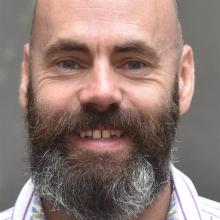
His loss is a significant one.
Since 2009 Dr Hazelton has championed Dunedin’s built heritage, earned the respect and admiration of its major property owners and greased the axles of local-body bureaucracy to ensure his vision of a cutting-edge city dressed in heritage frocks could be realised. He has been a categorical success.
While Dr Hazelton’s work to revitalise Dunedin’s historic warehouse precinct may be what he is most well known for, his achievements stretch much further.
His collaborative approach with owners of heritage buildings across the city has led to several restoration projects and the promise of several more.
He has played a significant hand in the lifeline given to the Dominican Priory, was involved in saving Dunedin’s historic courthouse and has given his time, enthusiasm and skills volunteering for an array of projects bringing vibrancy to Dunedin’s inner city.
Despite featuring frequently in this newspaper, Dr Hazelton has always played down his own role in the city’s successes, hailing the work of others and the potential Dunedin already offered.
Indeed, Dr Hazelton didn’t rebuild the city’s heritage buildings himself or finance the work from his own back pocket.
Most of those who did are still in Dunedin and will continue to contribute to the city’s renewed energy, beauty, confidence and prosperity.
Most of the city council staff members and elected representatives who laboured alongside Dr Hazelton will presumably continue driving Dunedin’s resurgence as a vibrant heritage city.
What will be lost is Dr Hazelton’s vision, enthusiasm and conviction that Dunedin could be better than it was if only it would help itself.
That belief was evident in last week’s Otago Daily Times report on his resignation, in which he spoke of his belief in Dunedin’s potential.
When people worked together, he said, so much was possible "irrespective of all the challenges there might seem to be".
Conversely, in the same report Dr Hazelton referred to "a hard core of local knockers who are Dunedin’s own worst enemies".
When delivered by someone widely lauded for cooperation and collaboration, such reflections bear consideration.
Of course thoughtful objections and criticisms are essential in a healthy democracy but there is no doubt Dunedin harbours some stubborn strains of discontent which seem impervious to the city’s improving fortunes.
In his own role, rather than simply critique what he didn’t agree with, Dr Hazelton offered solutions and that, more so than stone and streetscapes, may well become his legacy.
As Dunedin continues to punch a hole through the notion it is yesterday’s city, perhaps the best way to ensure that legacy does not end with Dr Hazelton’s resignation is for the rest of us to pick up where he left off; giving our free time to help organise events; taking time to pull weeds in a city street; encouraging building owners on their heritage projects; striving for positivity on the myriad Dunedin-focused online forums and, where there are disagreements, offering pragmatic alternatives instead of blanket disdain.
Dr Hazelton has chosen not to discuss his reasons for leaving, though it is inevitable some of those who settle in Dunedin will eventually move on.
The city’s small population and relative isolation will never offer everything to everyone all of the time.
We wish him well on the next chapter of his life and thank him for giving so much of himself to the chapter he is now closing.
There is no doubt Dunedin would welcome him with open arms if he ever chose to wend his way back to the city he has done so much for.












